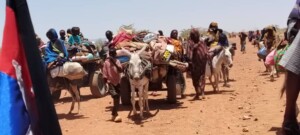Schoolgirl raped as Darfur farm violence continues
Farmers are have been killed, wounded, and raped by herders in Darfur in the past weeks and farms have been destroyed by livestock. The Sudanese government seeks better protection for the farmers and their land.
 A girl carrying firewood in South Darfur (Albert González Farran/Unamid)
A girl carrying firewood in South Darfur (Albert González Farran/Unamid)
On Tuesday, a 13-year-old schoolgirl was raped by a herder in Central Darfur. Residents of Kutum and of Zamzam camp for the displaced in North Darfur took to the street in protest against the repeated attacks by herdsmen on farmers. A delegation from the Dutch Foreign Ministry visiting Darfur stated that the recurrent attacks on farmers in Darfur illustrates the lack of enforcement of the Rule of Law.
A 13-year-old schoolgirl collecting firewood south of Mali village near Nierteti in Central Darfur on Tuesday, was raped at gunpoint by a herder on Tuesday.
A relative of the victim told Radio Dabanga that farmers passing by found her in one of the creeks, bleeding badly. They took her to the village.
The incident was reported to the Nierteti police.
'Blood for blood'
Yahya El Khams, a spokesman for the Forces for Freedom and Change (FFC) in Kutum, told this station that herders drove their camels and cattle into farms in the area of El Hamra, south-east of Kutum in North Darfur on Monday. When the farmers confronted them, the herders opened fire and wounded several, five of them seriously.
He explained that members of the Kutum Locality Committee and local resistance committees intervened. They captured one of the alleged attackers with his weapons, seized 2,000 heads of cattle, and took the suspect to the military garrison of Kutum.
In response to the repeated attacks by herdsmen on farmers, and the destruction of their crops, the residents of Kutum went out in a mass demonstration on Tuesday morning. They marched to the locality offices, chanting “Blood for blood!”, “Disarming the militiamen is a revolutionary request”, “No to early grazing”, and called for the dismissal of the locality’s executive director.
The acting commander of the Kutum military garrison called on the protesters to form a delegation of community leaders from the area to meet with the garrison leadership to discuss the problems and reach solutions. He also called upon the victims to send a representative to that meeting as well.
Demand for retribution
Residents of Zamzam camp for the displaced, south of the North Darfur capital of El Fasher, carried out a peaceful march on Tuesday demanding retribution for the killing of farmer Abdelbagi Bashshar, who was shot dead by herdsmen on Sunday.
The protesters raised banners demanding that those involved in the killing of the displaced farmer be brought to justice and that the militiamen be disarmed.
They also condemned the continuing shortages of food, education, and health care in the camp.
They called on Prime Minister Abdallah Hamdok to comply with their demands, which they presented to him during his first visit to North Darfur in early November.
Yesterday, in a meeting with the acting governor of North Darfur, Minister of Cabinet Affairs Omar Manis instructed the strengthening of deployment of regular forces in agricultural areas to protect farm fields, reduce encroachment into farmland by livestock, and work towards social peace.
Dutch delegation
A delegation from the Dutch Foreign Ministry confirmed that the recent attacks on displaced people returning to harvest their crops in Darfur illustrates the lack of enforcement of the rule of law.
The delegation said during their visit to North and Central Darfur, which lasted several days, that the ongoing peace process provides a golden opportunity to bring peace to Darfur.
The delegation stated that the purpose of their visit was to learn how Unamid can contribute to supporting the peace process. They discussed this in meetings with Unamid, displaced people, tribal leaders, civil society activists, and government officials in El Fasher and Zalingei.
Radio Dabanga’s editorial independence means that we can continue to provide factual updates about political developments to Sudanese and international actors, educate people about how to avoid outbreaks of infectious diseases, and provide a window to the world for those in all corners of Sudan. Support Radio Dabanga for as little as €2.50, the equivalent of a cup of coffee.












 and then
and then